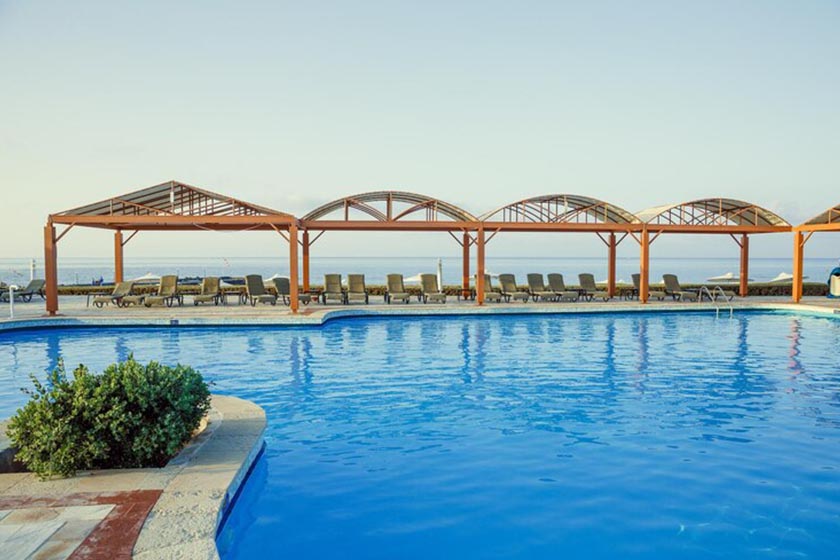“Maintaining a saltwater pool is easy and affordable. It’s much less expensive and time-consuming than a traditional chlorine pool. Saltwater pools do not have to be drained, the walls do not have to be brushed or scraped, the filter doesn’t need backwashing, and the pH and alkalinity are automatically maintained.
Minerals do not build up, so the water remains crystal clear. Most of all, there’s no chlorine odour, no dry, itchy eyes, and no one has to worry about accidental contact with chemicals.
In this article, I’ll cover can salt water pools raise your blood pressure?
Can Saltwater Pools Raise Your Blood Pressure?
Yes, saltwater pools can raise your blood pressure. It’s because of the nature of salt water: salt contains dissolved salt, and when you sweat, you’re essentially creating a small saline solution at the surface of your skin.
Your skin is naturally acidic, so it’s called electrolysis when you sweat in the pool. It increases the pH of the water, which increases the chlorine demand because it wants to react with the increased chlorine to balance out the pH.
You’ll need to add more chlorine to your pool because it will no longer be balanced.
The good news is that there are salt-water pool systems that don’t use chlorine. These are typically more expensive, but they exist, such as the salt-water pool system that uses a titanium dioxide system to sanitize the water instead of chlorine.
Can People With High Blood Pressure Swim in Salt Water?
No, you can’t swim in salt water because it will be too harsh on your skin. Saltwater is often not chlorine-free.
If you swim in salt water, even if you don’t feel the effects of the salt on your skin, the minerals in the pool will inflict damage on your body and can cause serious health concerns.
Does Your Body Absorb Salt in Salt Water Pools?
The answer is yes, your body does absorb a small amount of salt. However, the body will try to expel it.
The salt in a saltwater pool is Sodium Chloride, which is different from Sodium Bicarbonate in most public and private swimming pools. The reason being is when you add sodium bicarbonate to a public pool, the pH levels increase dramatically, which can cause skin and eye irritation.
Salt also makes the water feel smoother and more comfortable on your skin and prevents any issues with high pH levels. And it provides added softness to the water, which feels great on your skin.
However, there is a downside, with excessive use of salt in the water (i.e. heavy bather load), it can be challenging to maintain the recommended chlorine levels to keep things safe, healthy and clean. Once chlorine levels drop, it may become necessary to close the pool until further chemical additions bring the pool back into balance.
Need the best pool water clarifier? Click Here.
Does Swimming in Salt Water Dehydrate You?
Saltwater pools have been around for a while but have recently become much more popular. Saltwater pools are the same concept as regular swimming pools, but the difference is the water has salt added to it. The salt creates chlorine which prevents mould and bacteria from growing in the water, so you don’t have to shock your pool or add extra chemicals like you would with a traditional pool.
And if you’ve ever swam in a saltwater pool, you’ll notice that the water feels different. Saltwater pools typically have a saltier feel than other pools, especially at first.
Ah, but that’s about similarities between saltwater and regular pools.
Chlorine creates the chemical bonds that attach to the contaminants and whisk them away to the filter for removal. The minerals in saltwater pools do not create the chemical bonds that attach to pollutants, so this sanitisation method is ineffective in these pools.
Think of your body chemistry as a pool in which all kinds of stuff floats around—bacteria, viruses, perspiration, skin cells, sand and hair. If you’re dehydrated, it’s harder for your body to hold onto fluids because your cells become shrunken; they lose volume and take up less space. Regarding your blood plasma, dehydration means less water for your blood cells to mingle with.
How to Maintain a Saltwater Pool?
Saltwater pool care and maintenance are not as simple as it seems. Saltwater pools need a more thorough approach to cleaning and care to ensure that the water remains safe and healthy for your family.
One of the most common problems that saltwater pool owners face is the production of excess algae, which can have a fast growth rate. This can be prevented by adding a pool of algaecide from time to time.
But when an algaecide is not enough, you might consider changing your pool system. A more effective way to keep your pool free of algae is by adding a pool clarifier. Pool clarifiers help break up the algae cells, which in turn help prevent any new algae from growing in your swimming pool.
Before you even think about adding the saltwater pool treatment system into your pool, let’s look at some of the things you’ll need.
- The saltwater or chlorine generator pool systems need to be installed where the water temperature does not fall below freezing levels and would actually need to be at least 40 degrees or higher for the system to work correctly.
- When you first get your pool or spa, we suggest you buy all the chemicals your dealer recommends for your type of pool. Many start off with a bucket and scoop, but an automatic chemical feeder is a better tool for measuring your chemicals and dissolving them more thoroughly.
